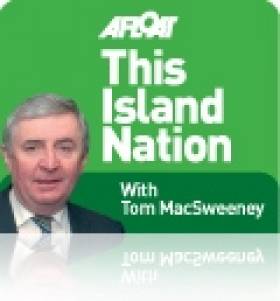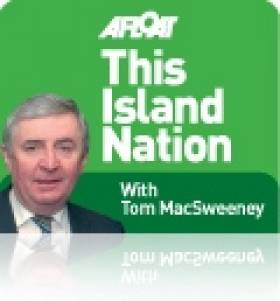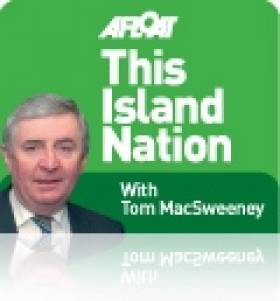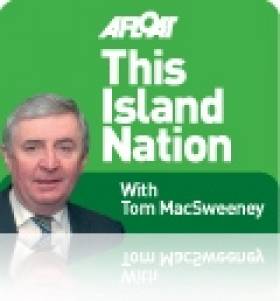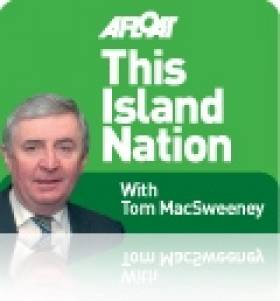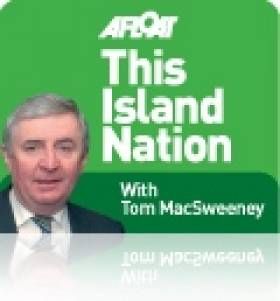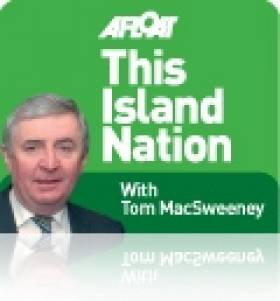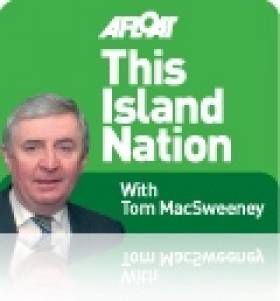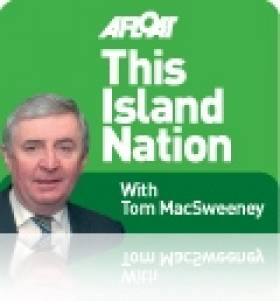Displaying items by tag: Tom MacSweeney
Cork Harbour Health, Sea Bass, Irish Fishermen & Rogue Waves
#islandnation – This week in THIS ISLAND NATION – health in Cork Harbour, sea bass and Irish fishermen, shipping unions take unusual action, where have the Puffins gone, rogue waves and much more...
Cork Harbour is a great local and national resource, generally regarded as the second biggest, best and most beautiful natural harbour in the world. I say that not just as a Corkman living in the harbour area, but because it is generally accepted.
There have been and remain several environmental battles on-going about the harbour involving development proposals by the semi-State Cork Port Company and for a national toxic incinerator and added to all of this Cork Harbour is the location of perhaps the biggest environmental problem Ireland has to resolve - the dumps of waste left behind by the former Irish Steel company on Haulbowline Island, alongside which the Naval Service is based.
The Government's lethargy in dealing with this problem after twelve years of reports warning about dangers to human health is disgraceful. When is work going to start on the remediation of Haulbowline Island in Cork Harbour, is a question I have been asked following public information meetings held by Cork County Council about the matter. It seems that anyone who expects to see work get underway in the near future on the proposed 'capping' of the East Waste Tip on the island, at a cost of €40m., will be disappointed. That proposal was in response to a Government request, but there are other areas of concern on the island and there is no firm indication that the State has any plans to deal with them. They are the site where the main steelworks stood and the South Tip. I have been given to understand that it could take over a year before even a waste licence is obtained to allow the Council undertake any remedial work on the East Tip.
Checking previous investigations about Haulbowline, there is a 2001 report which warned that there was a high risk to humans from PCB spills and to the marine environment from metals and high to moderate risks to humans from windblown-dust. These were just some amongst the predicted dangers highlighted by environmental consultants.
Twelve years later the Government has still not acted and by failing to do so its concern for the people who live and work in Cork Harbour in the vicinity of the former plant is open to challenge. Cork County Council has indicated its concern about the situation and awareness of contaminant issues pertaining to the site but has made clear that it does not own the site and does not have direct authority to intervene.
It is time for the Government to show more concern for the health of the people of Cork Harbour.
Fishing – FOREIGN VESSELS CAN CATCH BASS IN IRISH WATERS – BUT NOT IRISH FISHERMEN
Next June the EU Fisheries Commission is proposing to issue Total Allowable Catches for sea bass, based on the fishing track records of EU fishing nations.
Irish fishermen are unlikely to be given any quota because our Government has banned fishing for bass in Irish waters, even though British and French vessels are allowed to catch bass in Irish waters and land them into Irish ports!
This has been described as "a national self-inflicted scandal" by the Federation of Irish Fishermen which represents the country's fishing organisations. The TACs will be granted on the basis of fishing for bass in the years 2000 to 2010 and Ireland has no record as the Government banned commercial fishing for this species in the mid-90s. This was under pressure from angling interests and to protect the species. The Irish ban did not apply to foreign vessels in Irish waters.
"This is a cause of intense anger and frustration for the Irish fishing industry," said the FIF. "Other EU Member States can fish, catch and land sea bass, even into Irish ports, while Irish fishermen are prevented from catching the fish by an Irish Government decision."
The FIF has been asking for the fishery to be re-opened for several years, with a specific proposal which would have allowed a fishery over 30 miles off the South East Coast in order not to interfere with recreational angling.
"This is a self-inflicted disaster by the Government which has ignored reasonable proposals by commercial fishermen for many years and which would have gained scientific evidence about the future of the fishery," according to the FIF.
While anglers will justify the ban, it is questionable that non-Irish vessels are allowed to catch sea bass in Irish waters while Irish boats are not.
Shipping – UNIONS TAKE UNUSUAL ACTION
Shipping trade unions have taken the unusual step of announcing that they will adapt the familiar 'Fairtrade Mark' to judge the performance of shipowners. Nautilus International, the UK and Dutch trade union which includes Irish seafarers in its membership, has joined forces with the Swedish maritime union, SEKO, to introduce the 'Fair Transport' mark. This, they announced when launching the scheme in Brussels, is to see some of the key welfare principles of the fair trade movement applied to shipping. They said they took their action after asking the Fairtrade Foundation to include a clause in its licensing agreement so that any product displaying the 'Fairtrade Mark' would have to be transported on a ship meeting internationally agreed crew welfare standards.
"The Foundation wasn't interested so we are now asking stakeholders to join with us in developing our own scheme which will recognise good employers and encourage poor performers to raise their standards," the unions stated, indicating that they will launch a 'Fair Transport Mark' to be displayed by quality European shipping operators as a symbol of their commitment to the highest safety and environmental standards of shipping operation and "decent treatment of crews" as well as seeking to underpin the employment of European seafarers.
COSTA CONCORDIA DISASTER REMEMBERED
Survivors of the Costa Concordia cruise ship disaster on the Italian coast and relatives of the 32 people who died marked the first anniversary on Sunday with the unveiling of memorials to the victims, a Mass in their honour and a minute of silence at the exact moment that the cruise ship hit a reef off Tuscany. The first event of the day-long commemoration was the return to the sea of part of the massive rock that tore into the hull of the 112,000-ton ocean liner on January 13, 2012 and remained embedded as the vessel capsized, with 4,200 passengers and crew aboard. As fog horns wailed, a crane on a tug lowered the boulder onto the reef off Giglio. Affixed to it was a memorial plaque. Survivors and relatives of the dead were on a ferry watching. A land-based memorial was unveiled after a Mass and ceremony honouring rescue crews.
The Costa Concordia Captain, Francesco Schettino, remains under house arrest, accused of multiple manslaughter, causing a shipwreck and leaving the ship before all passengers were evacuated. He maintains that he saved lives by bringing the ship closer to shore rather than letting it sink in the open sea and claims that the rocks which the vessel hit were not marked on the chats
Capt. Gregorio De Falco of the Italian Coast Guard, whose blunt instruction to Captain Schettino to get back on board his ship during the disaster, was present at the ceremonies.
The ship remains capsized off the port of Giglio. Latest indications are that it will take until September to prepare the ship to be rolled upright and towed from the rocks to be dismantled.
Environment – WHERE HAVE THE PUFFINS GONE?
Research into the migratory patterns of Atlantic Puffins which reside on the island of Skellig Michael on the Kerry coastline in the Summer has shown that they travel across the entire Atlantic as far as Canada. One of the suggestions is that they follow the small oil-rich fish, capelin. Although Puffins have previously been tracked from Scotland and Wales the Irish study, using tiny tracking devices, is the first to show the birds making it across the entire Atlantic.
WHAT IS A ROGUE WAVE?
When news reports quote "rogue waves" what does that mean? What exactly is a "rogue wave?"
They are not as prevalent as media reports would indicate. A "rogue wave" can be twice as high as the highest waves normally seen in an ocean area under a given set of weather and sea conditions. "Rogue waves" have been part of maritime folklore for centuries, but their existence in reality is less proven.
The first "proof" was in 1996 when a 25 metre wave (about 75/80 feet) was recorded in the North Sea.
LOUGH HYNE FIND
There may have been a human settlement at Lough Hyne near Skibbereen and Baltimore about 4,000 years ago. That is the conclusion being reached after a small piece of flint stone discovered in the area was forwarded to the National Museum. A polished stone axe head was found there in 1954, so the latest find appears to support the habitation theory. Archaeologists have put the primary source of flint finds as in the Antrim area of Northern Ireland, making this one unusual.
Sailing – CAPE CLEAR
I have never seen as many yachts anchored in South Harbour Cape Clear, one of my most favourite spots on the West Cork coastline, as in this photograph of the harbour. It was sent to me by author and islander Chuck Kruger who was one of my leading contributors when I broadcast maritime programming on RTE Radio. Born in the USA he and his wife, Nell, bought a farm on Cape Clear Island in 1986 and he has just published yet another book, "Whiff of Whales," a collection of short stories set on the island.
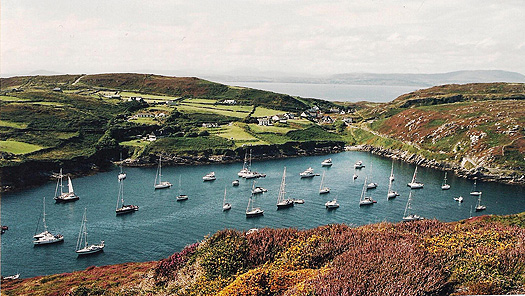
"Taken on a Summer's day from our farm," says Chuck.
Email: [email protected]
Tom MacSweeney on Twitter: @TomMacSweeney
Ireland is Plotting a Course for Compulsory Boat Registration
#islandnation– This week in THIS ISLAND NATION .... Can politicians be trusted to imposed compulsory boat registration? Preserving fishing tradition... Restricting access to the wheelhouse ... A 27-year wait ends at Glandore and much more .....
BOAT REGISTRATION
There are good reasons to have a register of boats in Irish waters. Many EU countries do. The UK and Ireland do not. The Irish Marine Federation (IMF) has called for a mandatory scheme for the identification of recreational vessels. Now Minister for Transport Leo Varadkar has indicated that a 'Vessels Registration Bill' is amongst his priorities. But there are also reasons to be cautious. Experience teaches wariness about politicians when they propose regulations affecting an area of life that has previously escaped unnecessary control.
Such legislation has been expected for some years and there have been indications of what it would contain, such as vessel identification for search-and-rescue; ensuring that boats are covered by insurance; a system to stop the avoidance of VAT on buying boats, all reasonable. However, there are additional issues to be watched.
These include whether the proposals will involve a system of taxation or licensing to swell Government financial coffers, but presented as ostensibly good for the marine sector. For example, will there be another form of 'water tax' imposed to use a boat under the guise of a licence? What restrictions will the State seek to impose on the freedom to go boating, to sail, to use a motorboat, a Rib other watercraft? Will there be compulsory "water licences" akin to "driving licences". Ridiculous to suggest? Perhaps, but there could be a reasonable argument made for such a licencing system, for safety reasons. But how would all of this affect the freedom to use the water and how would it be implemented? Would it be a 'licence' for the employment of legions of public service inspectors.
There are good reasons to require leisure craft entering Irish waters to notify the authorities, such as drug-running prevention and other breaches of the law. The only system that exists is Customs clearance which, according to some visitors, can be 'hit-and-miss,' depending upon the areas of the coastline. Let us not rush to judgement, but do let us be cautious when the State comes calling with new regulations to control the freedom to use the water.
Registration of vessels of all sizes, from small boats to container ships, is done under the Register of Shipping Act. It is not compulsory at present for leisure craft.
Maritime Tradition – DRAFT-NET FISHING
Maintaining tradition is important and in Jack Howard's home in Passage West on the edge of Cork Harbour I discussed the old craft of draft netting. Jack is Chairman of the Cork Draft Net Fishermen's Association who are allowed to fish on the River Lee from May 12 to August 14. The season has been gradually squeezed into a smaller operational period - four days a week from May to July, then 5 days in July and back again to four from Tuesday to Fridays in August. In Cork City and County, under the South/Western Fisheries Board, there are only 17 draft net licences left and the allowed fish catch is 1,632. A generation ago there would have been around a hundred licences and boats operating in the Cork Harbour area.
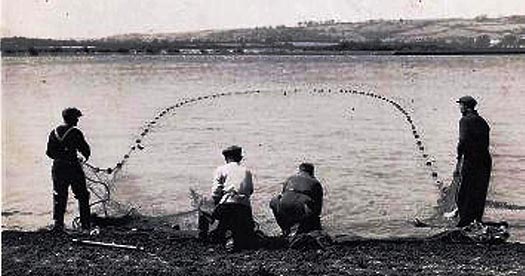
Draft net fishing on the river Lee in the 1960s - from Jack Howard's collection
"We are doing what is in our blood. It is a tradition and we want to keep it," he told me as he showed me a photograph underlining the pride of a traditional craft handed down through his family. It shows draft net fishermen working on the River Lee and is reproduced here. "There has been pressure from angling sources to abolish draft netting, but anglers should respect that we have a right to catch salmon as well as them and that it is an Irish tradition which deserves to be maintained. There is enough for everyone if everyone respects the others' interests."
I have seen draft net fishermen on the Lee and in other locations around the coast. On the Slaney, Nore, Barrow, Suir and Blackwater small flat-bottomed 'cots' are used to fish in the tidal estuaries. They have distinctive styles and as well as draft netting were used for snap-netting and drift-netting until its abolition. They were also used for eel fishing until that traditional fishery was also closed down by Government decision. In North Mayo 160 draft net men had licences. In Killary Harbour and at Leenane draft netting was often a tourist attraction during summer months.
Draft-netting is a small fishery, but in many coastal regions a way of life, carried out in estuaries and inshore bays where a boat rows out from shore, paying out a net held at the other end onshore. The boat rows against the tide so that the net forms a semicircle. When a salmon is spotted inside the enclosure or felt hitting the net, the boat closes the circle and the net is hauled in.
Shipping – REDUCE ACCESS TO THE WHEELHOUSE
The UK Marine Accident Investigation Branch has recommended that shipping companies should restrict access to the wheelhouse. In a report on a collision in the English Channel last year it says that the master of one of the ships involved had been "distracted from his primary role of watchkeeping" by the presence of other people on the ship's bridge. The collision involved the Dutch-flagged refrigerated cargoship Spring Bok and the Maltese-registered LPG tanker Gas Arctic in March about 6 nautical miles south of Dungeness. No one aboard either ship was injured but both vessels suffered structural damage.
THREAT TO SHIPYARDS
A Danish report warns that one in four of the world's shipyards could close in the next two years due to a slump in orders. There are 542 active shipyards worldwide, but 142 have no orders.
Sailing – 27-YEAR WAIT ENDS AT GLANDORE
"After 27 years, we have at last acquired a clubhouse for Glandore Harbour Yacht Club. It may have taken a long time but the reward is that we have ended up with a perfect location for our clubhouse, 100 metres from the harbour," says Commodore, Diarmuid O'Donovan. "It has been the Club's aim to have a clubhouse since its formation in 1985 and a lot of effort has been put into acquiring one which will undoubtedly add to the sailing attractions of Glandore. We have come a long way over the past few years and membership has grown significantly."
The club sailing programme caters for Cruisers, Dragons, Squibs and other dinghies and extensive training programmes include ISA training courses and a sailing programme for local schools each summer. There are club racing fixtures from May to September. The clubhouse will add to the harbour facilities when the CH Marine Classic Regatta is held there from July 20 to 26. This regatta was first run in 1992.
"We have a programme to encompass all classic boat lovers - from those who simply want to watch from the shore, to the most dedicated of boat owners," said the Commodore who has invited all interested sailors to pre-register on the club's website www.glandoreyc.com for monthly newsletter updates. Glandore has been given a €25,000 grant for remedial works, including disabled access. It has trained 10 new instructors for summer sailing courses.
Angling – SALMON SEASON
There are 55 salmon fisheries open and 59 closed for the angling season which has just begun and 32 rivers classed for "catch-and-release". For the first time since 2007 the River Liffey from Islandbridge in Dublin to Leixlip Dam in Kildare falls into this category. Recommended guidelines for catch-and-release have been published. Copies of a 20-minute video, "Catch and Release – The Future in Your Hands," is available free from Inland Fisheries Ireland, Balheary Road, Swords, Co.Dublin – phone 01 8842600.
Marine Environment – JELLYFISH STUDIES
Marine scientists will be carrying out further studies of jellyfish as a result of what have been described as "plagues of jellyfish" on the Mediterranean coastline last summer. There have been eight summers in a row of such "plagues" though previously these had occurred only once in every decade. Investigations will examine whether climate change is associated with the cause.
Fishing Industry – FENIT MEMORIAL
A memorial depicting the bronze statue of a fisherman is to be erected in Fenit, County Kerry, dedicated to local fishermen who lost their lives at sea. Seamus Connolly, a leading bronze sculptor, has been chosen to make the statute which will show a fisherman mending his net. The memorial will include an "area for reflection" incorporating memorial plaques.
Email: [email protected]
Tom MacSweeney on Twitter: @TomMacSweeney
Recession is Affecting Sailing
This week in THIS ISLAND NATION .... recession affects sailing ... when is it safe for ships to leave port ... an Irish refuge for skates... offshore exploration to increase and new protection for whales ...
RECESSION AFFECTING SAILING
As we face into a New Year I hear from sailing clubs in a number of places around the country that maintaining membership in the recession is likely to be a major challenge in the months ahead, while others involved in the marine leisure sector are also preparing plans for coping with its effects. The pattern appears to vary from one location to another, with some evidence that boatyards and marinas are also experiencing different affects, as are boat sales.
From what I am being told – and I would be interested to hear the views of readers – it seems that, where good cost deals can be found, some owners are opting to keep their boats in the water at marinas offering special occupancy rates for winter where berths, vacant because regular holders have hauled out. At the same time some yards seem to be finding that 'hauling-out' numbers are down, while others tell me regular customers are continuing to store afloat for the winter. There is also some evidence of cutbacks on spending for improvements or even maintenance where owners are opting to do it themselves when they had not done so before. As I say, the pattern is uneven around the coast, but it is not surprising that costs are determining decisions by owners.
From around the country I hear that club committees are giving particular attention to maintaining membership. Several clubs have told me that membership fees have not been changed for a few years and that this approach will be maintained. The Royal Cork Yacht Club in Crosshaven which last year introduced a monthly membership system as a response to the economic problems is taking a pro-active approach following a membership survey and a members' forum. Overall membership numbers are holding up reasonably well, but they have been examining the mix within categories and found, as is the case in other clubs, that the costs of family membership are a concern.
A number of clubs have told me that that, where previously an entire family would join and even the non-sailors would be included, it has become noticeable that only the family members who are active in sailing are joining. This reflects families watching expenditure closely, a situation likely to get more intense when the Government's swingeing Budgetary attacks on family incomes come into effect. All clubs need to hold onto current members and encourage new ones, particularly younger entrants to the sport, which has an ageing profile in several parts of the coast. The RCYC has decided to respond by reducing the costs of family and ordinary membership. Members over 65 face an increase of 50 per cent as a result, but their cost will still be less than half that of younger members. Those over 75 are not charged a membership fee.
"We have recognised concerns expressed by members and are making the adjustments," RCYC Admiral Peter Deasy has said.
The recessionary financial impacts are, without doubt, going to make 2013 a difficult one in monetary circumstances for many families and individuals. As a result, sporting activities and the costs of them may feel the impact.
Exploration – MORE ACTIVITY OFF IRELAND
Ireland has one of the most favourable financial arrangements for oil and gas exploration in the world. No matter what 'spin' the Government puts on the issue that is the reality. The Government can justify these arrangements on the basis that four decades of drilling has yielded just two major commercial finds – Kinsale Gas and the Corrib Field. Exploration is an expensive business and commercial returns need some degree of assurance. At present profits from oil and gas production in Irish waters are taxed at 25 per cent, twice the standard corporate rate, but could increase to 40 per cent for a particularly lucrative find. However, that taxation level is levied only after companies are able to write-off considerable levels of costs involved in the exploration. In the coming year it will be interesting to see how things develop as there have been undeveloped finds in Irish waters which were not considered commercial in the past, but the different energy world of today is changing how those discoveries are now viewed.
The Providence discovery of the Barryroe Field off West Cork and the prediction that it could provide at least 280 million barrels of oil has raised considerable interest. Exxon Mobil, the major oil and gas group which owns over 27 per cent of what is known as the Dunquin Prospect in the southern part of the Porcupine Basin, has indicated that it will undertake exploratory drilling about a hundred miles off the south-west coast in Block 44. Indications are that this could cost in the region of €70m. or more. That is a lot of investment money but the company's profits in 2011 were put at 41 billion dollars. The Barryroe Field is on Block 48. In the 80s there was quite a bit of exploratory drilling around the Celtic Sea off the South Coast, with a few indication of hydrocarbons being present. Market conditions prevailing then – energy prices and other cost factors – decided the companies involved that it was not worth pursuing the prospects. But times are different now, so 2013 could be an interesting year for exploration and how the Government of this cash-strapped nation will be proved right or wrong in the financial attractions it has offered to exploration companies.
Fishing – SKATES TAKE REFUGE
Marine scientists from Bangor and Queen's Universities in the North and the Marine Institute in Galway have discovered a natural refuge for the endangered species of flapper skate in the Celtic Sea. Small areas of seabed which have below-average fishing because of uneven areas that make trawling difficult are providing the refuge in the North-East of the Celtic Sea. EU regulations require fishermen to put back into the sea any flapper skate which are caught. However, the major problem is that slow growth and reproduction biological patterns amongst these fish mean that even low levels of fishing mortality are a serious danger to the future of the species.
Shipping – WHEN TO SAIL
Pressures on Ships' Captains from owners to sail even in bad weather is a contentious issue, as to whether the Master of the vessel has the overall authority of making the decision or the commercial demands of the owner dictate. Now a Russian shipowner has been charged with causing the deaths of nine crew aboard a cargoship that sank in the Sea of Okhotsk in November. The 611 dwt. vessel is alleged to have been overloaded and authorities in Russia have said that the charges follow on the owner's insistence that the ship sail despite bad weather and improper cargo procedures.
Environment – NEW PROTECTION FOR WHALES
Whales are to get more protection off the Californian coast in the USA where the United Nations' safety at sea body, the International Maritime Organisation, has approved new ship traffic rules designed to protect slow-moving endangered whales from ship collisions. These make changes on the approaches to San Francisco Bay and the ports of Los Angeles and Long Beach and in the Santa Barbara Channel.
Migrating blue, fin and humpback whales are prone to ship strikes since they are often lured to the California shoreline by plentiful krill. All three species are endangered. In 2010, five whales died in ship accidents in the area outside San Francisco Bay. Los Angeles and Long Beach ports handle more than twice as much shipping container traffic as any other USA port.
"This is a win-win situation for maritime safety and whale protection," according to the National Oceanic and Atmospheric Administration's Office of National Marine Sanctuaries in the USA.
Tom MacSweeney on Twitter: @TomMacSweeney
#islandnation – This week on THIS ISLAND NATION .... coastal communities beat Coast Guard management for the second time; when will the Government realise the economic value of sailing; sea snails have an acidic message; shipping emotion; seafood is doing well..
TIME FOR COAST GUARD MANAGEMENT TO CONCENTRATE ON SERVICE
For the second time management of the Irish Coast Guard has been defeated in their attempts to close the coastal radio stations at Malin Head and on Valentia Island. Sense has prevailed and safety of life at sea has been recognised as more important than bureaucracy. It is a victory for the good sense of coastal communities and recognition of the vital importance of local knowledge when life is in danger at sea as well as the importance of routine day-to-day operations of maritime radio.
The decision is commonsense as well as recognising that whoever closed the stations could face serious criticism should it result in controversy as a result of any subsequent loss of life at sea.
Minister for Transport Leo Varadkar in announcing his decision, appeared to be disgruntled about the manner in which the Oireachtas Joint Committee on Transport and Communications questioned Coast Guard management at a hearing about the issue. In his Dail statement he said the reviews into the Coast Guard services are ongoing, but he wanted to assure local communities that the three coastguard centres would not be closed. He said he was disappointed at the treatment of officials from his department at the Joint Committee meeting and claimed that there were a small number of members whose contribution was deeply unfair and unjustified.
It was this Committee which revealed several serious issues about the way in which the Fisher Report about the Coast Guard was handled, matters which still require an answer into the transparency and independence of examinations of State services.
It was revealed at that Oireachtas hearing that the original draft of the report had recommended what the Minister has now approved, that both Valentia and Malin remain open, but this was changed subsequently. By whose pressure and for what reason has not been disclosed. Who interfered with the consultants' report at that stage and sought to change it? Where is transparency and accountability to the public interest in that regard? Neither has Coast Guard management explained why the recommended upgrading of the stations was delayed after the last failed attempt to close them in 2009?
The battle to protect Malin and Valentia does not in any way reflect on the work or value placed of the Dublin radio base, but the correct decision is that there should be three stations working together for the benefit of saving life at sea and maritime radio communications in the widest sense. Coast Guard management was, once again, wrong in what it tried to do and should now learn its lesson. There was even an original proposal this time to replace Malin and Valentia with a station in the Minister's own constituency, at Blanchardstown. It would be difficult for any politician to defend such a proposal.
I have seen the complete Fisher Report and the responses of Coast Guard management to it, from which there are questions remaining to be answered.
It is now time for senior management to concentrate on responding by developing the service in the best interests of safety of life at sea and stop trying to close Malin and Valentia coastal radio stations.
Shipping – EMOTION MIXED WITH MEMORY
Through the windows of the Cork Port company's board room I could see the branches of the Christmas trees swaying in the wind as the weather brought in the first signs of an impending gale, with rain driving down on a ship moored across the river. The words of Fr. Christy Fitzgerald came across the room: "In this weather who would want to be a seafarer? Who would like to be on a ship in tough weather conditions like today, out at sea, where crews are dependent entirely on themselves? It is a calling that many people would not do. There are families today who will be thinking about the conditions in which their family members may be at sea somewhere in the oceans of the world. We need seafarers, let us remember them.
Then, across the room came the singing of the congregation and the words: "Eternal Father strong to save, whose arm hath bound the restless waves, o hear us when we cry to thee, for those in peril on the sea."
I was at the annual ecumenical remembrance service for seafarers organised in Cork by the Southern Branch of the Maritime Institute of Ireland, an emotional, evocative occasion as the names of those who had died in the past year on the southern coastline were remembered. It was the biggest turn-out I have seen at the ceremony in recent years, with all maritime organisations, professional and leisure, represented. I thought of those who in Dublin at the same time would be holding the national ceremony to remember seafarers at the memorial on City Quay.
We should always remember and appreciate seafarers.
Sailing – VOLVO ECONOMIC LESSON
The enormous economic benefit which a well-developed national sailing approach could yield for Ireland is shown in the report about this year's Volvo Race in Galway. Compiled by the J.E.Cairnes School of Business and Economics at NUI Galway it has shown that the event was worth €60.5 million to the economy. Over 500,000 visitors attended events during the race festival from June 30 to July 8, of which 16 per cent came from outside Ireland. The organisers and Galway City invested €7.6m. so the overall nett benefit was considerable.
"The magnitude of the event in terms of the economy of the Galway area was exceptional," said Dr.Patrick Collins of NUI Galway's Whitaker Institute. "Direct expenditure was €35.5 million, with indirect spend of €25m."
There was discussion after the previous Volvo visit in 2009 about what legacy it would leave behind for prolonged benefit. Now there is a second confirmation of the value of sailing as an economic earner. Yet our Government fails to adequately support such commitment.
SUFFERING THE CARIBBEAN!
While Irish weather is chilling the bones and wetting the bodies four Cork sailors are in much better weather, taking part in the ARC, the annual transatlantic rally from Las Palmas de Gran Canaria to Rodney Bay at Saint Lucia in the Caribbean. Royal Cork YC member Aidan Heffernan has the crew of Joleen Cronin, Denis Nagle and John Hanley aboard his Dehler 36 Indulgence which he races in Cork Harbour and along the south coast. There are 200 boats altogether taking part in the 2,700-nautical mile event which is regarded as "a friendly race for cruising yachts" and can take between 14 and 21 days to complete, depending upon weather conditions.
Fishing – SEAFOOD FOR THE FRENCH
Despite the recession the Irish seafood sector is doing reasonably well, "holding its own" I am told from the industry. Sales reached an estimated €749 million last year. For the first half of this year exports are up 20 per cent in value to €253m. compared with the first half of last year. The latest development is that Breizon Ltd., an Irish seafood company in Connemara has established a joint venture company with two French partners based in Lorient. Bord Iascaigh Mhara (BIM) has assisted the development of the new venture which will involve an agreement with Keem Bay Fish Products to supply seafood (shellfish from Breizon and smoked seafood from Keem) to meet increasing demand in the French market. The joint operation will deliver fresh Irish seafood direct to retailers, restaurants and fishmongers. The French partners are Argis Galacsea and Les Viviers de Keroman in Lorient.
BIM Chief Executive Jason Whooley said there are 180 registered seafood companies now with processing facilities in Ireland. While many Irish operations are small-scale with turnovers between €3m. and €10m., European competitors have a turn-over five times that. Lack of scale is the biggest factor regarded as limiting the profitability of the Irish seafood sector. BIM says it is working with the industry to support business development.
Environment – ACIDIC SEAS ALERT
The shells of some marine snails are dissolving as the seas around Antarctica become more acidic. That is according to a study published in the journal, Nature Geoscience. As CO2 levels in the air increase from the burning of fossil fuels, so the seas are becoming more acidic.
DOLPHIN DILEMMA
There are around 195 bottlenose dolphins permanently on the East Coast of Scotland who regularly feed in the Moray Firth Special Area of Conservation where they are a tourist attraction. Scientists studying them have concluded that the small and isolated nature of their population makes them prone to being disturbed so organisations have joined forces to understand the impact of boat movements.
A computer model has been developed by the University of Aberdeen to predict effects on dolphins from planned offshore renewables facilities at Nigg and Whiteness and associated vessel movements. Tour boats and other marine traffic have also been assessed and the results show that boats which behave predictably are less likely to have an adverse effect on dolphins compared to those which follow the animals. The results were published this week by the Scottish Natural Heritage organisation.
Email: [email protected]
Twitter: @TomMacSweeney
Shipping Shock, Figaro, Tall Ship Crew, Dead Sailors & Seaweed Kayaking
#islandnation – A major world shipping shock, a Corkman Figaro-ing, a tall ship crew drawing their guns in port, remembering 235 dead sailors in Donegal, seaweed kayaking and an Irish Volvo crewman goes it alone around the world, all in your THIS ISLAND NATION round-up this week.
SHIPPING INDUSTRY SHOCK
More than a thousand ships owned by Maersk sail the world's oceans every day, so the decision by this huge Danish conglomerate, A.P. Moeller-Maersk, not to continue investing in shipping has shocked the industry. The world's biggest container ship operator announced this week that it will instead focus on its oil, drilling rigs and ports units.
"We will move away from the shipping side of things and go towards the higher profit generators and more stable businesses," the company's Chief Executive, Nils Andersen, said announcing this major shift in strategy. The company's container business has been affected by a slowdown in routes between Europe and Asia where it has cut capacity amid a volatile outlook for the industry.
Maersk Line, the conglomerate's container shipping unit, has struggled with profitability due to the global economic slowdown and an oversupply of vessels for world trade of which its size makes it a barometer. The Maersk fleet carries more than 15 per cent of all sea-borne containers. Last year it suffered a net loss of $540 million, while the oil division reported a profit of $2.1 billion, the drilling unit earned $495 million and ports which it owns made $649 million.
"Over the next five years we are not going to invest significant amounts in Maersk Line. We have sufficient capacity to grow in line with the market. We will move away from shipping towards the higher profit generators," Nils Andersen said.
Most shipowners are experiencing difficulties in the current economic situation. Some of have been trying to raise their rates, as well as cutting costs to counter falling ship charters due to the over-supply of vessels. It is feared that this situation will continue.
Sailing – FIGARO-ING FROM CORK
It is great to see another Irish sailor launching himself onto the international short-handed offshore racing scene. Twenty-one-year-old Cork sailor David Kenefick from Currabinny and a member of the Royal Cork Yacht Club at Crosshaven where he learned the sport has entered the French Figaro sailing programme, the tough arena where top Irish sailor Damian Foxall first came to prominence. Shorthanded offshore sailing is popular in France with big races like the Vendée Globe and Route de Rhum enjoying major media coverage and attracting thousands of spectators. Winning sailors become household names. A frequent visitor to Irish ports the Figaro has been sailed for 44 years. Next year will be only the fourth time an Irish sailor is involved. Three Irish skippers have competed in the past Damian Foxall (1997 & 1998); Marcus Hutchinson (1998 & 2000); Paul O'Riain (2007). Damian has since won the two-handed Round-the-World Barcelona non-stop race and been on this year's winning Volvo Round the World yacht.
"I'm really excited about the Figaro campaign," David said. "The number of offshore legends that have taken part is unbelievable. I know how tough it is going to be. I am beginning to appreciate the complexity and the need to manage myself, my fitness and my commercial programme," David said.
The sport of shorthanded offshore racing requires total commitment and years of practice, preparation and competition before skippers get to competitive level.
Tall Ships – CREW DRAW GUNS IN PORT
With the Argentinean rugby team in Ireland, the country's tall ship, Libertad, used as a training vessel by their Navy, is detained in the port of Tema in Ghana after a USA hedge fund took legal action. NML Capital, owned by billionaire Paul Singer, claims to be owed $370 million since the Argentine Government's default on bonds dating back to 2001. It wants $20m. before the ship is released but has been described by the Argentineans as a "vulture fund" which refused a restructuring deal last year that would have imposed losses of 65 per cent on bondholders.
{youtube}3RrtDRzXRQo{/youtube}
Ghana has been accused of breaking maritime law and Argentina is taking the detention of Libertad to the International Court of Justice and the United Nations. Sailors aboard Libertad drew guns to prevent Tema harbour authorities moving the ship to a less busy part of the port to allow other ships access. The authorities then cut off the ship's power and water supplies, described by Argentina's Minister for Defence as "a violation of the most basic human rights." The crew is being moved off the ship and brought home. Libertad has visited Ireland several times. Argentina has lost court battles in the USA against paying bondholders. On December 2 next it has said it will pay $3 billion but only to bondholders who accepted restructuring of their debts at a loss.
History – REMEMBERING 235 DEAD SAILORS IN DONEGAL
The 235 officers and crew of HMS Saldanha which was shipwrecked in Lough Swilly in December 1811 will be remembered by the people of Donegal at a ceremony on Sunday, December 2 at 3 pm. A graveside memorial will be dedicated and Portsalon Golf Club is helping to host and run the event to which the organising committee say that everyone is welcome.
Environment – SEAWEED KAYAKING
I have met kayakers in various places during my sailing along the West Cork coastline. Close to the water, impelled by the power of their arms, they seemed quite cheerful about their exploits and the sport in which they were taking part. At anchor on a pleasant evening in Castletownshend this summer a group passed by, the scene lit by moonlight, the gentle sound of their paddles on the water, the swish of hulls as their kayaks caressed the sea, they seemed to be nocturnal water people, melting away under the stars, leaving only a gradually disappearing trail of phosphorescence behind them.
Jim Kennedy who owns and runs Atlantic Sea Kayaking Based at Reen Pier near Union Hall since 1995 and operating courses all around the coast is a strong enthusiast for the sport for which he says no one is too old. Next year, one of the courses he plans is "Foraging for seaweed from a Kayak," using the kayaks to access t areas where sea vegetables grow in abundance, identify "and learn how to sustainably harvest cook some of the seaweeds we find from the natural organic food source by which we are surrounded."
Adventure – IRISH VOLVO CREWMAN GOES ALONE
Chinese sailor Guo Chuan was the media crew member on the Irish entry, Green Dragon, in the 2008-2009 Volvo Race, becoming the first person from China to sail around the world. Now he is doing another circumnavigation, this time alone, having set out this week from Qingdao, the coastal city in east China's Shandong province, where during the Volvo he had been given a hero's welcome when the Irish/Chinese entry arrived there. This time he is on a solo, non-stop sail around the globe at the age of 47. He was in Galway this summer at the Volvo Race with his boat to promote the voyage plan - across the Pacific to Cape Horn in Chile, into the Atlantic, then the Indian Ocean via the Cape of Good Hope at the southern tip of Africa before crossing the islands of Indonesia to return to the starting point in Qingdao.
"I have been preparing for this for about three years. It has been step-by-step, learning the skills, finding the right boat, preparing the boat and training with a coach," he said.
Guo holds a Master's Degree in aircraft control from the Beijing University of Aeronautics and Astronautics and worked on China's commercial satellite launch projects. His life changed on a trip to Hong Kong in 2000 and a day's sailing at the Royal Hong Kong Yacht Club - the first time he had ever been out on a boat.
"I had no real idea about sailing but I really knew in my heart straight away from that day that I wanted to learn," he said.
Your comments on THIS ISLAND NATION are very welcome. Email: [email protected]
TWITTER @TomMacSweeney
Oil Pollution, Ship Break-ups, Dublin Bay Viewing Tower & Angling
#islandnation – Denying ships refuge when in trouble is a questionable policy... a sea watch tower in Dun Laoghaire... Two World Presidents from Ireland ... Angling is good this November and the people of Malin to Mizen, all in this week's THIS ISLAND NATION marine round-up ....
RESPECT FOR SEAFARERS
Every country needs ships to obtain supplies of the goods they need and to export what they want to sell, but do they give enough respect to the seafarers who sail those ships?
Emergency rescue assistance is provided, but what about providing a port of refuge when a ship is in trouble and seeks help?
Increasingly nations, including Ireland, have shown themselves somewhat unwilling to help in this regard. There can be justifiable reasons, such as the dangers of pollution or other threats to life or of damage in port from the condition of a ship. However, denying a port of refuge could also increase the potential level of pollution and damage.
The case of the badly-damaged German-flagged containership, the 6,732 teu MSC Flaminia which spent nearly two months at sea trying to find a country which would allow it to dock has illustrated this, but the ship does also raises questions about the transport of dangerous goods in containers. There were 2,876 containers aboard the ship, 149 were classed as holding dangerous goods. A fire and explosion occurred in one of the ship's holds while on passage from Charleston in the USA to Antwerp.
Two crew members were killed fighting the fire and the vessel was abandoned by the remaining 22 as it listed ten degrees due to the cargo shifting and water used in the fire-fighting. Seven ships went to their aid. They were picked up by the tanker DS Crown. Three were transferred to the containership MSC Stella which took them to the Azores for medical treatment. The rest were landed in Falmouth where they were looked after by The Mission to Seafarers.
Salvage tugs, including the Dutch Fairmouth Expedition and the UK Anglian Sovereign brought the blaze under control and took the ship, which had considerable damage, in tow. Three cargo holds were destroyed, but the engine room, stern section, accommodation and forecastle were not damaged. Then the problem of where to bring it started. The UK, the Netherlands, France, Belgium, Spain, Portugal and even Germany where the ship is registered, all refused to help as the owners and the salvage companies sought a port where they could discharge and decide on repairs. The reason was that the ship was considered to be a potential floating timebomb. Many of the items listed under the International Maritime Dangerous Goods Code were aboard.
The owners, Redderei NSB, kept the ship at a position 240 nautical miles south-west of the British coastline as they sought a port. Their CEO, Helmut Ponath, said it was "shocking that a ship under the German flag" was not being given permission from European countries to enter a port of refuge.
NAUTILUS seafarers' union senior national secretary Allan Graveson said flag states had a responsibility to help and the case of yet another ship being refused a port of refuge was disturbing and of great concern to the safety of seafarers.
After waiting for two months, the German government eventually had to accept their responsibilities as the country where the ship was registered and allow it into Wilhelmshaven where no pollution or other difficulties occurred as it was unloaded and assessment of repair work began.
The lesson of the November 2002 sinking of the oil tanker Prestige off Spain has apparently, not been learned. Then the Spanish Government refused the request of the Captain for help and wouldn't allow his ship into port. A subsequent oil spill could have been prevented had they helped him. It was worse as a result and then, typically of governments rather than admitting to their own failures, they arrested the Captain who had tried to avert the disaster.
On November 13, 2002 the tanker had sent out a distress call, requesting an emergency tow to the nearest port. One of its oil tanks had ruptured and the ship had developed a dangerous list of thirty degrees to starboard. The crew had correctly counter-ballasted the vessel with two portside wing tanks. Fearing the shop might sink at sea, Captain sought permission to get the Prestige into port, where the oil could be pumped out, but the Spanish refused to help. The vessel was off the Galician coast. The Spanish Government ordered that it towed further out to sea, the French Government did the same, fearing an oil spill near their coast. When their orders were complied with the Captain's concern was proved correct, the ship breaking up from the pressure of the seas and sinking 130 miles off Spain. The resultant pollution need never have occurred had the problem been dealt with in a port.
• Jack Devanney of the U.S. Center for Tankship Excellence has published a paper which is available on the web, "The Consequences of Providing and Refusing Refuge." It examines all the coastal state refusals and provisions of refuge to stricken vessels. From his organisation's data there is only one case where provision of refuge resulted in a sizeable (2,000 ton) spill at the refuge provider. On the other hand, there are cases where failure to provide refuge turned smallish to moderate spills into two huge spills totalling 160,000 tons. In both cases, almost all the oil came ashore in the countries which had refused to provide help. "We have identified at least 10 casualties in which provision of refuge very likely prevented a 200,000 ton plus spill," he says and adds: "Enlightened self-interest can be a strong reason for providing refuge."
Environment – DUBLIN BAY VIEWING TOWER
The National Maritime Institute is examining the possibility of providing a viewing tower for Dublin Bay which would be in the spire of its museum building in Dun Laoghaire. It could cost more than €300,000. Institute Secretary, Breasal O Caollai, told its annual meeting that it would help financially, create jobs and be a tourist attraction for the area.
Sailing – TWO IRISH WORLD PRESIDENTS
It is good to see two Irish sailors honoured internationally and good for the sport of sailing here.
Kinsale Yacht Club's Paralympic sailor John Twomey has been appointed President of the International Association for Disabled Sailing (IFDS) for a four-year term. This honour comes only months after John competed at his 10th Paralympics, a record for any Irish person competing at either the Olympics or Paralympics.
Robin Eagleson of Lough Erne Yacht Club has been elected World President of the International J/24 Class Association, the World's largest keelboat class, which has usually elected its President from the North American fleets. Robin was instrumental in bringing the BMW J/24 European Championships to Howth last year. The World Championships – also sponsored by BMW - are coming to Howth in August 2013.
Angling – ACTIVE ANGLERS AROUND THE COAST
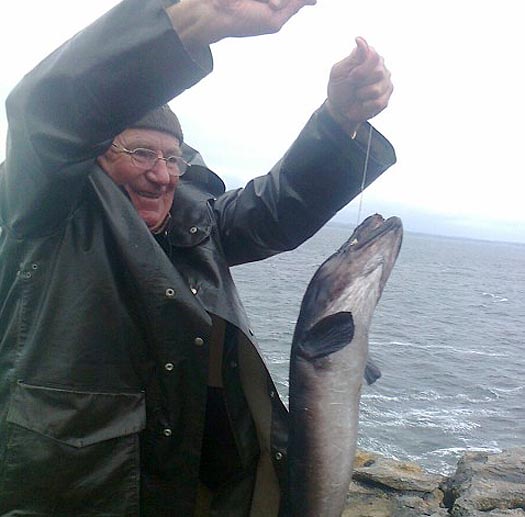
Willie Hartley and the heaviest fish caught in County Clare
Anglers are enthusiastic sportsmen and women, as well as children and around the coast, despite changing weather and river conditions which dictate the type of fishing and species which can be caught. Weather for November has generally been kind to anglers so far with plenty of activity both in freshwater and at sea. Prospects continue to look reasonably good although, the forecast is for colder days ahead, according to Inland Fisheries Ireland. At sea, flounder fishing is becoming popular at this time of year, with good catches reported from the East Coast and North Clare where conger up to 10 kilos have been caught from rocks with Willie Hartley catching the heaviest fish of 10.6 kgs for this year in the local club, as you can see in the accompanying photograph from Ken O'Neill and Inland Fisheries Ireland. Cork Harbour anglers have reported an increased level of cod.
My Book Choice – IRELAND'S ATLANTIC SHORE
Photographer Valerie O'Sullivan has captured stunning images of Ireland's Atlantic shore and the seven counties and people from Mizen to Malin whose shores are touched by this ocean in this book.
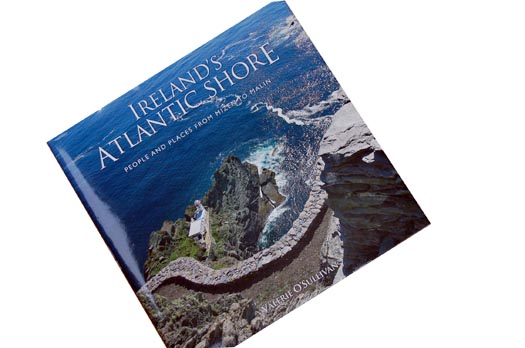
Accompanied by script observations, the beauty of this rich landscape comes across, as well as the life and activities surrounding the sea in those counties, including regattas, festivals, pilgrimages, even fair days, as seen by fishermen, farmers, windsurfers and tourist visitors. Valerie is a full-time photographer based in Killarney and a regular contributor to the Irish media. Her work has won many awards. Her striking images capture the essence and unpredictability of the Atlantic Ocean as it embraces Ireland.
• Published by Collins Press in hardback at €24.99.
• Your comments on THIS ISLAND NATION are very welcome. Email: [email protected]
• TWITTER @TomMacSweeney
Hybrid Car Carriers, Whales, Sea-Sickness & Preserving Island Life
#maritimenews – The world's first hybrid car carrier, whale trouble in Baltimore, is it safe to live near the water, 'heave ho' the stomach, preserving island life read more in THIS ISLAND NATION ....
SEASICKNESS – HEAVE HO!
SEASICKNESS, mal de mer, is without doubt the curse of sea-going and has, at some time, had an effect on most sailors, myself included. Away back in 1897 Thomas W.Knox, writing in 'How to Travel,' advised: "Many persons will tell you that it is an excellent thing to be seasick as you are so much better afterwards.." And in 1912 the Scientific American magazine reported: "Perhaps no malady to which mankind is subject is productive of so much real suffering, with so low a percentage of mortality as the affliction known as seasickness," while Milton Berle, the first major American television star, summed up his suffering: "I had mal de mer aboard a yacht. If somebody had killed me I would have made him my sole heir!"
So why are people susceptible to this dreaded problem which has found no answer from the doctors, philosophers and writers who have discussed it for centuries?
The results of a survey of the 223 crews who took part in the last edition of the Global Challenge, the ''wrong-way-round-the world-sailing-race,' as it is known because it goes against the prevailing winds, are interesting. It focussed on the penultimate leg of the race across the Atlantic from Boston to La Rochelle in France. I have raced across the Atlantic myself, which can throw up (definitely!) a lot of challenges to one's stomach! Two-thirds of those sailing experienced seasickness. Factors influencing those affected included age – those older than 24 were less susceptible - and gender, more women than men were seasick.
Eighty-four per cent were able to carry out their duties but 16% were so incapacitated that they couldn't. Recovery time varied, the worst cases taking five days. The survey was carried out by Yachting World magazine. It also showed, as old sailors knew best when they worked the square-rigged tall ships, rigged to sail downwind, that point of sailing is most comfortable. An old sailor advised me when I began sailing: "The wind is best coming from behind you!"
LIVING NEAR THE WATER
I live near the water, at Monkstown in Cork Harbour and it has always seemed to me that there is a particular pleasure in being able to do so, to walk along the riverside, to look at boats, at wildlife along the shore. Humankind has always settled habitation near water, for good reasons - transport, the availability of water itself, the food source it provides, but in the wake of 'Superstorm Sandy,' it is interesting to see that public debate has arisen in the USA about why people want to live so close to water.
I recall the words of former President and avid sailor, John F.Kennedy: "We are tied to the sea and when we go back to the sea, whether it is to sail or to watch, we are going back from whence we came."
"Humans have an affinity for water. It is in the genetic makeup of a species first nurtured in the watery womb. In America, it is clear that we find comfort where water flows over the earth," the American media is reporting. "But in these days of collapsed houses, flooded subway tunnels and washed-out roads in Superstorm Sandy's wake why do we build alongside water and crave its attractions because it has a dangerous side, whether it is Sandy; or Katrina that wiped away much of New Orleans; or rivers overflowing their banks in New York. The joy of living near the water is counterbalanced by the devastation it can bring."
"Water surrounding some of our cities is starting to be a liability," said Daniel Stokols, the Professor at the School of Social Ecology in the University of California-Irvine.
MARINE WILDLIFE – BALTIMORE SAGA ENDS IN DISAGREEMENT
There are several locations around the coast where the skeletons of whales are preserved and have provided a beneficial, local economic support through tourist interest. But in West Cork the saga of the fin whale which stranded at Baltimore Harbour in the summer amidst a lot of publicity has ended in disagreement with the towing of the whale carcass to open water between Cape Clear and the Fasnet Rock and sinking it with 3 tonnes of weight attached.
The Irish Whale and Dolphin Group says this ended "any chance of salvaging the skeleton, which we feel is a shame as it could have been a wonderful community resource that would have benefitted local tourism, as well as being a fantastic educational and conservation amenity ".
The IWDG is not happy with what it describes as "a well-orchestrated but ill- informed group across the Bay" that won the "shouting match" and convinced local Cork Co. County representatives to have it removed from the Carthy Islands area, in Roaringwater Bay and towed out to sea. "Some of the arguments for this course of action bordered on the bizarre, but it seems the lobbyists conclusion was that this whale represented a 'toxic' timebomb. Statements made without any evidence ... The reality is that there was no evidence that this carcass was toxic".
SHIPPING – A YEAR TO SALVAGE CONCORDIA
Watching the development of the salvage work at the wreck of the cruise ship Costa Concordia and the court hearing involving its Captain Francesco Schettino, I wondered what he must be feeling when his lawyer asked the media scrum around the Italian courthouse to give some thought to this. The lawyer said the media and the public should have "some human feeling for the Captain" after the stress of the last ten months since the vessel sank in January. "He has a family too and he is suffering, give him at least some human consideration. He has feelings too," the lawyer said. Not many people feel much sympathy for the Captain and the families of those who died are still seeking answers about the sinking. A multinational team of more than 450 specialists has almost completed the stabilisation of the 950-foot long vessel off Giglio Island in Italy anchoring it to the rocky sea shore with four massive cables looped beneath its belly. It will take a year to complete the salvage.
Captain, Francesco Schettino, has accepted blame for causing the disaster in which 32 people died, but says others should share responsibility. The company has denied any responsibility and blamed him solely for the course he took when the Italian cruise ship crashed into rocks. While pre-trial hearings have finished it seems that it will not be until the Spring that a full trial will start.
SHIPPING – WORLD'S FIRST HYBRID CAR CARRIER
The world's first hybrid car carrier has been built by Japanese Mitsubishi Heavy Industries at its Kobe shipyard for OSK Lines and named the Emerald Ace. No association with Ireland in that name! Electricity is generated by a solar power system while the vessel is underway and stored in lithium-generated batteries which provide power so that diesel generators can be shut down in port when zero emissions are generated.
MARITIME TV PROGRAMMES – WILL ISLANDS SURVIVE?
We all live on an island, though a lot of people still don't seem to realise that, but look in from next Monday, November 12, at "AR AN OILEÁN", a four-part documentary series on RTE, exploring what it means to live on islands. Made by Loosehorse productions the series and explores island living in the context of dwindling populations. Despite the difficulties, island people and new residents are determined that they will not go the way of the Blaskets and other islands which became depopulated.
The story is told by islanders like Niamh Ní Dhrisceoil, a young teacher in her twenties who commutes every week from Cape Clear to Ballincollig near Cork City where she teaches and Steve Wing, English-born manager of the world famous Bird Observatory on Cape Clear (both pictured below). They are joined by neighbours and friends who opened their lives to the cameras for a year and by islanders on Inishmaan in the Aran Islands, to show why they believe there is a sustainable way of life on the islands for generations to come.
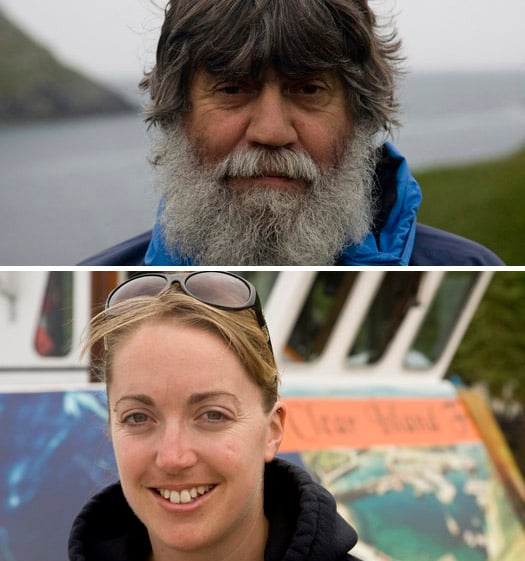
Email your comments on maritime matters to : [email protected]
Follow Tom for more maritime news and comment on Twitter: @TomMacSweeney
Ports Call for Co-ordinated Action, National Marine Plan & Col Regs
#islandnation – In THIS ISLAND NATION this week .... Determination at 70 .... The ports call for co-ordinated Government action .... Why is the public starved of information about the national marine plan? .... Galway Bay environmental controversy and who are the lobbying groups? ... Are the collision regulations understood and next year's coastal sailing gathering....
SAILING – OLDEST BUT NOT FINISHED
Sailing is a sport for all, at all ages and competitive sailing can vary from single-handed or fully-crewed racing boats to individual challenges, but round-the-world solo sailors are a breed apart.
Last Monday the oldest woman to sail solo around the world left Canada for her third attempt to do so non-stop. On two previous attempts she completed circumnavigations but stops in various ports caused by gear failure and damage at sea frustrated her non-stop attempts. With the distinguished surname of one of the great philosophers, 70-year-old Jeanne Socrates, left Victoria in Western Canada on the third attempt in her Najad 380 yacht, Nereida. She was forced to stop on Cape Town for repairs during her first attempt in 2009, which started in Lanzarote. A second non-stop attempt in October 2010 ended with a knockdown 100 miles west of Cape Horn the following January. However, she did manage to complete the single-handed circumnavigation last August after stopping in the Falklands, Cape Town, Tasmania, Tahiti and Hawaii.
"This is like any sporting challenge, I want to do it non-stop and I am determined to achieve it and be back here successfully, hopefully without any serious incidents along the way," she said on leaving!
PORTS – DUBLIN, CORK, SHANNON-FOYNES TOP PORT PROSPECTS
Since the launch of the Ocean Strategy Plan by the Government during the Summer there has been a lack of official information about progress on its implementation. The public is entitled to a better level of information about the implementation of plans which are announced with much publicity hype.
The Irish Maritime Development Office this week published its review of the capability of Irish ports to meet development requirements for the marine renewable energy. It reported a "consensus" amongst the ports on the absence of "any clear policy framework at a national level for the development of an ocean energy industry with the necessary political will to invest in the business."
This challenges the difference between what has been publicly said by various Government Ministers and what the Government is actually doing. My sources in the industry tell of dissatisfaction with attitudes they encounter. Consultations with some of the ports for the report were undertaken before the Government's marine plan "Harnessing Our Ocean Wealth," was published. This identified potential of the offshore ocean energy sector and proposed an action plan but not a lot has been heard about its implementation. The IMDO report has identified the need for clear, co-ordinated Government action to take advantage of the possibility of creating hundreds of jobs.
There was also general consensus amongst the ports about the need for a national website integrating information about Irish ports in terms of infrastructure and facilities to support construction and fabrication; operation, maintenance and servicing; and research and development. The IMDO says that this is something that would be relatively inexpensive for the Government to create and could be used as a central marketing and information platform by Government agencies and departments in communicating where national strategic competitive advantages lie.
Let's see if the Government's marine co-ordinating group responds positively or at all.
ENVIRONMENT – GALWAY BAY FISH FARM
The State fisheries board, Bord Iascaigh Mhara (BIM), has strongly attacked the environmental group, Friends of the Irish Environment and called on it to withdraw what is has described as a "spurious allegation" and apologise for what it alleges is a "slur" on BIM's reputation.
The row is over a claim by FIE that BIM suppressed reports regarding its application for an organic salmon farming license in Galway Bay which aims to create 500 jobs. The public consultation period for the project is underway, and closes at midnight on December 12. BIM has rejected the FIE allegation.
I will be interested to see how this develops.
There is a general issue about all environmental lobbying groups which, in terms of transparency, fairness and balance in public debate should be addressed. In dealing with State or public bodies we know information about them that is publicly available but there are so many different lobbying groups that a register of information about them, their membership strengths, who they represent, their financing, etc., would enable better assessment of their views.
SHIPPING – ARE COLLISION REGULATIONS UNDERSTOOD?
The Nautical Institute, the international professional body for seafarers, has raised the question of whether COLREGs are fully understood and if a lack of knowledge about them could be putting ships at risk.
In its journal SEAWAYS the Chief Executive, Philip Wake, says: "There appears to be a fundamental lack of understanding of the regulations by far too many mariners." The issue is discussed in the context of the 20th anniversary of the launching of the Mariners' Alerting and Reporting Scheme.
It could be added that there are many leisure sailors who also do not understand the collision regulations.
SAILING – GATHERING CRUISE
The Irish Marine Federation and Irish Sailing Association have announced 'The Gathering Cruise' as part of next year's plans for the celebration of the Irish diaspora.
It will take place from July 13 to August 1, with over 100 boats congregating in 'Gathering Ports' across the UK before sailing together to Ireland. "The Gathering Flotilla will assemble in Kinsale for a welcome reception," says the ISA and then "flotillas will have an opportunity to explore the coastline of West Cork and Kerry for a week of unscheduled cruising. All boats will then gather again in Dingle, Co. Kerry for a Gathering Cruise farewell reception and 'scattering' where boats will have the option to continue their cruise in a northerly direction in the company of other cruise participants. Gathering Welcome Ambassadors will be available in Welcome Ports along the Irish coastline."
BOOKS – JEANIE SHOULD HAVE BEEN A DIFFERENT COLOUR!
With the Jeanie Johnston hosting maritime stories aboardship in Dublin Port as to the atmospheric creaking sounds of the famine Ship's hull enveloping the audience I was interested to read that there was an original colour scheme for the Jeanie Johnston that would have made her stand out strikingly at sea – all yellow sails, red-coloured masts and a bright orange decorative strip with false black porthole outlets on the hull. That was proposed by Fred Walker, the ship's architect. When completed the tall ship was less dramatic in appearance – traditional white sails, natural wooden masts and a white strip with false black portholes.
That was one conception, reproduced in this book which was changed.
This book is predominantly a photographic record by the author who voyaged in her in 2005, Liverpudlian Michael English. My particular favourite picture is that of the two crew members who found a spot aloft to have an 'al fresco' lunch, while the one of crew members furling sail on the topsail yard will test your head for heights!
Sailing the Irish Famine Tall Ship Jeanie Johnston, by Michael English, published by Collins Press €29.99
Email your comments on maritime matters to: [email protected]
Follow @TomMacSweeney
Sea Crusades, Shipping Youngsters & A Kilmore Quay Ballad
In THIS 'ISLAND NATION' this week, I invite you to join me on a sea crusade, report that the Shipping Industry should encourage youngsters from Sail Training... A song for the Kilmore Quay fisherman who defied the EU ... 50 years of diving in by Galway university students ... Sunny but cold, the oddest fish in the sea .... More developments on boat security .... Piracy at sea levels fall and Limerick Water Safety Developments ...
JOIN ME IN A SEA CRUSADE
For some time I have been trying to raise interest in the concept of an independent, voluntary organisation to represent the widest interests of the maritime sphere. There has been some support, but it has been limited, despite the fact that over the past few years public interest in Ireland's maritime resources has increased. There is more awareness of the sea and that we are an island. In more and more circumstances, ranging from political to government, commercial, industry, fishing and leisure, I have heard the words used which I spoke for 20 years as a radio presenter: "This Island Nation...."
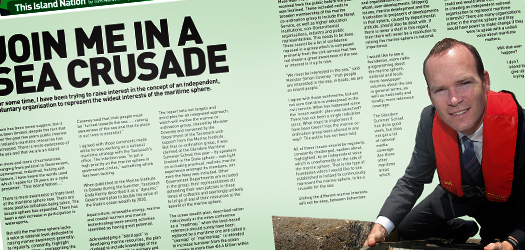
There is more awareness at State level of the maritime sphere now. There are more positive initiatives being taken. The leisure sphere has expanded. There has been a vast increase in participation in watersports. But still the maritime sphere lacks a voice at national level dedicated to raising marine awareness generally, to regularly, constantly, highlighting maritime matters - representing the marine across its widest perspective, from fishing to shipping, the marine environment, to the leisure sector.
My focus is to try to establish a maritime foundation which would do this. If you are interested, read more in the Autumn edition just on sale of Afloat magazine.
SHIPPING INDUSTRY SHOULD ENCOURAGE YOUNGSTERS FROM SAIL TRAINING
The Chief Executive of Sail Training International has told the International Chamber of Shipping that he is surprised "that there has been no systematic attempt by the shipping industry to encourage youngsters who have taken voyages on sail training vessels to seek jobs at sea."
CEO of STI Peter Cardy challenged the shipping industry at its annual conference to take advantage of what he described as "the vast incubator of potential talent" that existed for the shipping industry amongst young people who had shown an interest in the sea by taking a voyage aboard a sail training ship. He is the former Head of the UK Maritime & Coastguard Agency and said that the sail training sector was continuing to grow internationally. There had been 55 sailing vessels from 20 countries and 7,000 trainees of 31 nationalities involved in this year's Tall Ships Race.
"Given the continuing manning crisis in the shipping industry about which we hear I am surprised that there has been no systematic attempt by the shipping industry to encourage a flow of recruits from the sail training vessels."
KILMORE QUAY'S FISHING FACEBOOK
The Kilmore Quay Fishing Fleet has set up its own Facebook page on which Roger McGuire has written and placed via soundcloud.com 'The Ballad of the Saltees Quest,' a tribute to Skipper Jimmy Byrne following his refusal to dump monkfish and landing it on the quayside.
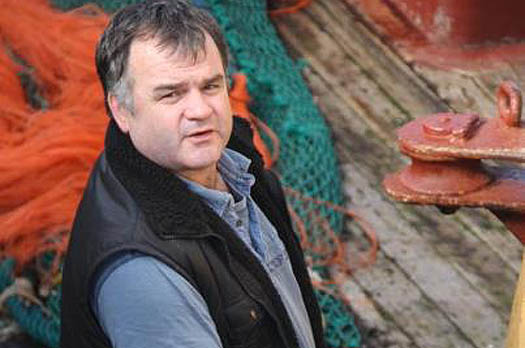
Kilmore Quay skipper Jimmy Byrne
"It's a little tune I threw together in support of Jimmy and the crew who made a stand by landing fish that by some stupid law they would have had to dump at sea. This action put them in danger of legal proceedings against them," says Roger. "I used the melody from an old Irish song called 'The Golden Jubilee'. The lyrics are all my own."
And here's the song!
FIFTY YEARS OF DIVING
The Irish Underwater Council, CFT, is making plans to mark its 50th anniversary next year and a commemorative booklet will be produced by the anniversary date in September 2013. The occasion will be marked on September 28 in the City North Hotel, Gormanstown, Co.Meath. However, one Irish sub-aqua club has already reached its 50th year in existence -
the NUIG/GMIT Sub-Aqua Club which launched its new 6.5m XS-650 RIB Rigid Inflatable Boat, Alice Perry. The club dives locally on a regular basis to such sites as Coral Beach, Bóthar Buí and Killary Fjord. Larger weekend trips also take place to dive sites all along the west coast, from Donegal to Cork. The club is open to all current students, alumni or staff of NUI Galway or GMIT. For further information on the NUIG/GMIT Sub-Aqua Club, or to join, visit www.galwaydiving.com
SUNNY BUT COLD – THE ODDEST FISH
The ocean sunfish is one of the oddest specimens in the seas and is being studied by scientists because of its pattern of swimming at depths as far as 2,000 feet under the surface, but then surfacing to bask on its side where sea birds then snack on parasites clinging to the sunfish's rough greyish skin. Basking may be a way for sunfish to thermally recharge themselves as they cannot tolerate prolonged exposure to cold ocean temperatures, according to the scientists. The sunfish is a flat oval shape found in tropical and temperate oceans, though an occasional one has been reported in Irish waters in recent years, seen as an indication of changing ocean temperatures.
Its scientific name is 'mola mola.' Mola is the Latin word for millstone and accurately describes the flat oval shape of this fish, the heaviest- known bony fish in the world. Bony means that their skeletons are composed of bones instead of cartilage. The weight of an average adult sunfish is about 2,000 pounds. The heaviest known sunfish weighed close to 5,000 pounds.
They eat mostly jellyfish but will also eat small fish, plankton, squid and crustaceans. Sunfish meat is not widely consumed by humans although considered a delicacy in some parts of the world such as Japan, Korea and Taiwan.
BOAT SECURITY
Following my report about boat and equipment thefts Kevin Hennessy has been in touch with me from Youghal where he heads up BoatWarden International Ltd., an Irish-designed and developed product, with all components sourced and assembled in County Cork.
"BoatWarden is a security and management system for small ribs to yachts. Some of the features we cover are - intruder alerts, high water in bilges, theft of boat, breaking of moorings, automatically switching on heat and lights, all from your smart phone," he tells me. "Our system will text up to 5 people if there is a problem. There is no annual fee and all our clients use a pay-as-you-go SIM card. We sell our product globally and the UK and Australia would be our biggest markets. We have units worldwide. The theft of boats right now is on the increase."
The company is developing video systems and I will be having a further look at its work in future weeks. It is good to see a Cork company developing responses to the problems of boat theft.
SEA PIRACY LEVELS DOWN
Sea piracy has fallen to its lowest level worldwide since 2008, as policing by international naval forces has deterred pirates operating in the waters off Somalia, new figures from the piracy watchdog this week indicate. The International Maritime Bureau (IMB) said there were 233 actual and attempted attacks on vessels globally in the first nine months of 2012, compared with 352 in the corresponding period last year.
The number of attacks by Somali pirates has fallen, with 70 attacks by the end of September, down from 199 in 2011 and the lowest number since 2009.
LIMERICK WATER SAFETY DEVELOPMENTS
Limerick County Council, in conjunction with Irish Water Safety and Loc8 Code Ltd. have started a pilot project which enables anyone requiring help at any one of 86 ringbuoy locations around the county to direct the emergency services to their position, with an accuracy of six metres. Ringbuoys and their holders along the Shannon River and Estuary, River Mulcair, River Maigue and dozens of other locations popular with members of the public have been fitted with Loc8 codes containing GPS coordinates. The information is accompanied by contact details for the Samaritans' support services to assist in the reduction of suicide through drowning.
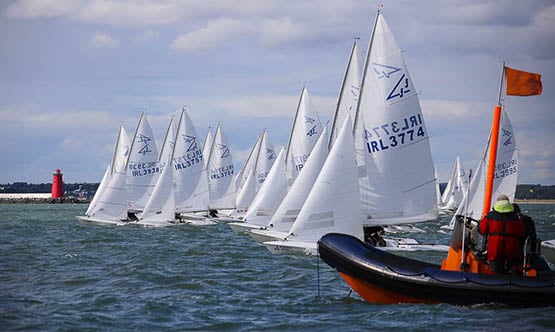
Brian Kennedy, Water Safety Development Officer, Limerick County Council; Cllr Leo Walsh; Con Murray, Limerick Local Authorities Manager; Gary Delaney, CEO Loc8 Code. Photo: Brian Gavin Press 22
Loc8 Codes were originally developed by GPS Ireland, run by former Naval officer and CEO of the company based in Crosshaven, Gary Delaney. "The placing of these codes on ringbuoys and their holders will help to further improve the emergency services' response times when dealing with an emergency incident," he said.
The 86 ringbuoy locations featured in the Loc8 Code pilot project include Castletroy, Foynes, Adare, Annacotty, Pallaskenry, Croom, Glin, Loughil, Askeaton, Castleconnell, Lough Gur, Bruree, Athlacca, Cappamore, Clareville, Montpellier, Murroe, Newcastle West, Pallasgreen, Abbeyfeale, Dromkeen, Bruff and Kilmallock.
Email your comments on maritime matters to : [email protected]
Follow Tom for more maritime news and comment on Twitter: @TomMacSweeney
Marine Journalist Tom MacSweeney Honoured by NUI Galway
#islandnation – NUI Galway have awarded Afloat correspondent Tom MacSweeney an honorary Degree of Master of Science, honoris causa at the Autumn Conferrings today in the Bailey Allen Hall at the University.
Almost 4,000 students will graduate from NUI Galway during the Autumn Conferring Ceremonies which are underway this week (19-26 October). NUI Galway will also confer five Honorary Masters Degrees during the ceremonies on Seán Beattie, Helen Meehan, Josie Sheáin Jeaic Mac Donncha, Tom MacSweeney and Jim Murren.
The Governing Authority of NUI Galway, on the recommendation of the College President, James J.Browne after consideration, awards honorary degrees to a small number of individuals "who have distinguished themselves in various walks of life."






























